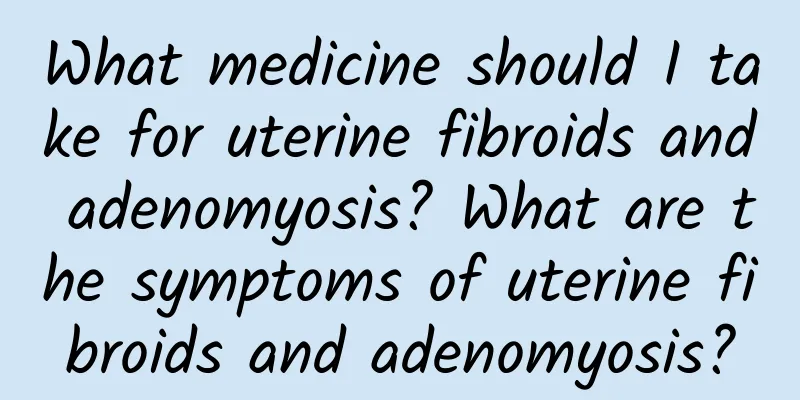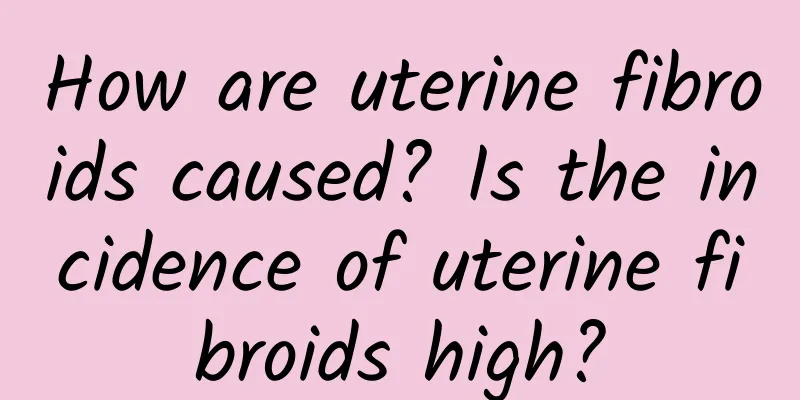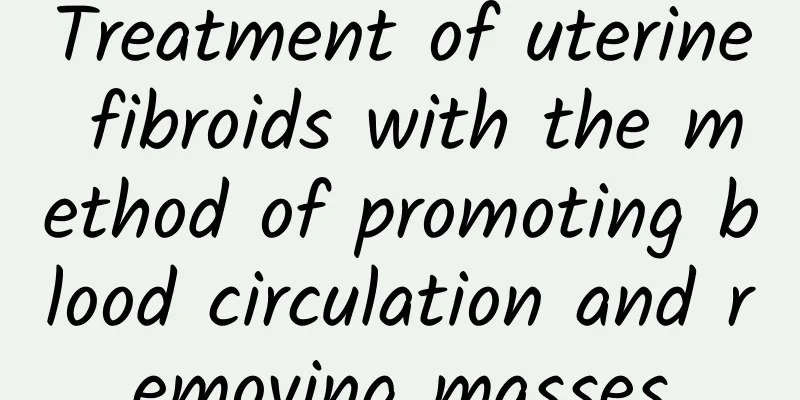What medicine should I take for uterine fibroids and adenomyosis? What are the symptoms of uterine fibroids and adenomyosis?

|
Uterine fibroids and adenomyosis are two common diseases among women. They refer to uterine fibroids and adenomyosis respectively. Many women suffer from these diseases, which lead to physical discomfort and reduced quality of life. So, when we suffer from uterine fibroids and adenomyosis, what medicine do we need to take? Let's take a look at it together. Uterine fibroids are a common tumor of the female reproductive system, mainly composed of uterine smooth muscle. It usually occurs in women of childbearing age and usually disappears on its own after menopause. Symptoms of uterine fibroids include irregular menstruation, prolonged and excessive menstruation, pelvic pain, and bladder compression. When treating uterine fibroids, doctors usually choose the appropriate treatment method according to the condition, such as drug therapy, surgical treatment, or interventional treatment. 1. Drug treatment: For early uterine fibroids, doctors usually first use drug treatment. Common drugs include luteinizing hormone-releasing hormone drugs and progesterone drugs. These drugs can inhibit the growth of fibroids by adjusting the hormone levels in the body. There are also some Chinese herbal prescriptions that can assist in the treatment of uterine fibroids, such as Xiaoyao Pills, Quyu Granules, etc. 2. Surgery: For patients with large uterine fibroids or severe symptoms, surgery is a common option. Surgery can relieve symptoms by removing the uterine fibroids, and in some cases, the uterus can be preserved. Common surgical methods include laparoscopic surgery and myomectomy. Adenomyosis is a disease related to the menstrual cycle, and its main symptoms are pelvic pain and abnormal menstruation. In the treatment of adenomyosis, drug therapy and surgical treatment can also be used. 1. Drug treatment: Drug treatment is the first choice for treating adenomyosis. Commonly used drugs include nonsteroidal anti-inflammatory drugs and oral contraceptives. Nonsteroidal anti-inflammatory drugs can relieve pain and inflammation, and oral contraceptives can reduce symptoms by regulating hormone levels. 2. Surgery: For some patients with severe cases, surgery is necessary. Surgery can relieve symptoms by removing the endometrium, and in some cases, the uterus can also be removed. Common surgical methods include laparoscopic surgery and adenomyectomy. In summary, uterine fibroids and adenomyosis are two common women's health problems. In terms of treatment, you can choose drug therapy or surgical treatment. In terms of drug treatment, luteinizing hormone-releasing hormone drugs and progesterone drugs can be used for uterine fibroids, and non-steroidal anti-inflammatory drugs and oral contraceptives can be used for adenomyosis. At the same time, surgical treatment is also a common option, and laparoscopic surgery or stripping can be used to relieve symptoms. However, the conditions of different patients are different, so individualized treatment should be carried out according to the doctor's advice. |
Recommend
Zero failure! Want to follow a high-protein, low-carb diet? 5 ways to succeed
Boiled chicken breast, boiled sweet potato and ch...
Cervical hypertrophy during pregnancy should be paid attention to
After a woman becomes pregnant, she will be liste...
What dietary therapy methods can help uterine contraction and relieve pain? Share two recipes with you
I believe that abortion is a last resort for wome...
What should I do if I have bleeding and lower abdominal pain many years after menopause?
What should I do if I have bleeding and lower abd...
How many methods are there for abortion? There are 4 treatments
In clinical treatment, there are many methods tha...
Can adnexitis be transmitted to other people?
Now more and more people are suffering from adnex...
Can I still get pregnant if I have premature ovarian failure with stem cells?
Stem cell therapy may help women with premature o...
Study: Drinking pomegranate juice can reduce appetite by 20%
Do you still feel hungry no matter how much you e...
5 major diets! Sleep aids make you lose weight the more you sleep
Diet is not only closely related to weight loss, ...
Does the endometrium really thicken after pregnancy?
During pregnancy, women have different physical c...
Lack of menstruation after miscarriage
Less menstrual flow after miscarriage is usually ...
What are the symptoms of benign uterine fibroids and what types of surgeries are there for uterine fibroids?
With the continuous development of society, many ...
What are the types of pelvic inflammatory disease?
Pelvic inflammatory disease has a serious impact ...
Analyze the causes of vulvar leukoplakia
The incidence of vulvar leukoplakia is as high as...
Dietary care for patients with irregular menstruation
Due to the increasing pressure of work and life, ...









